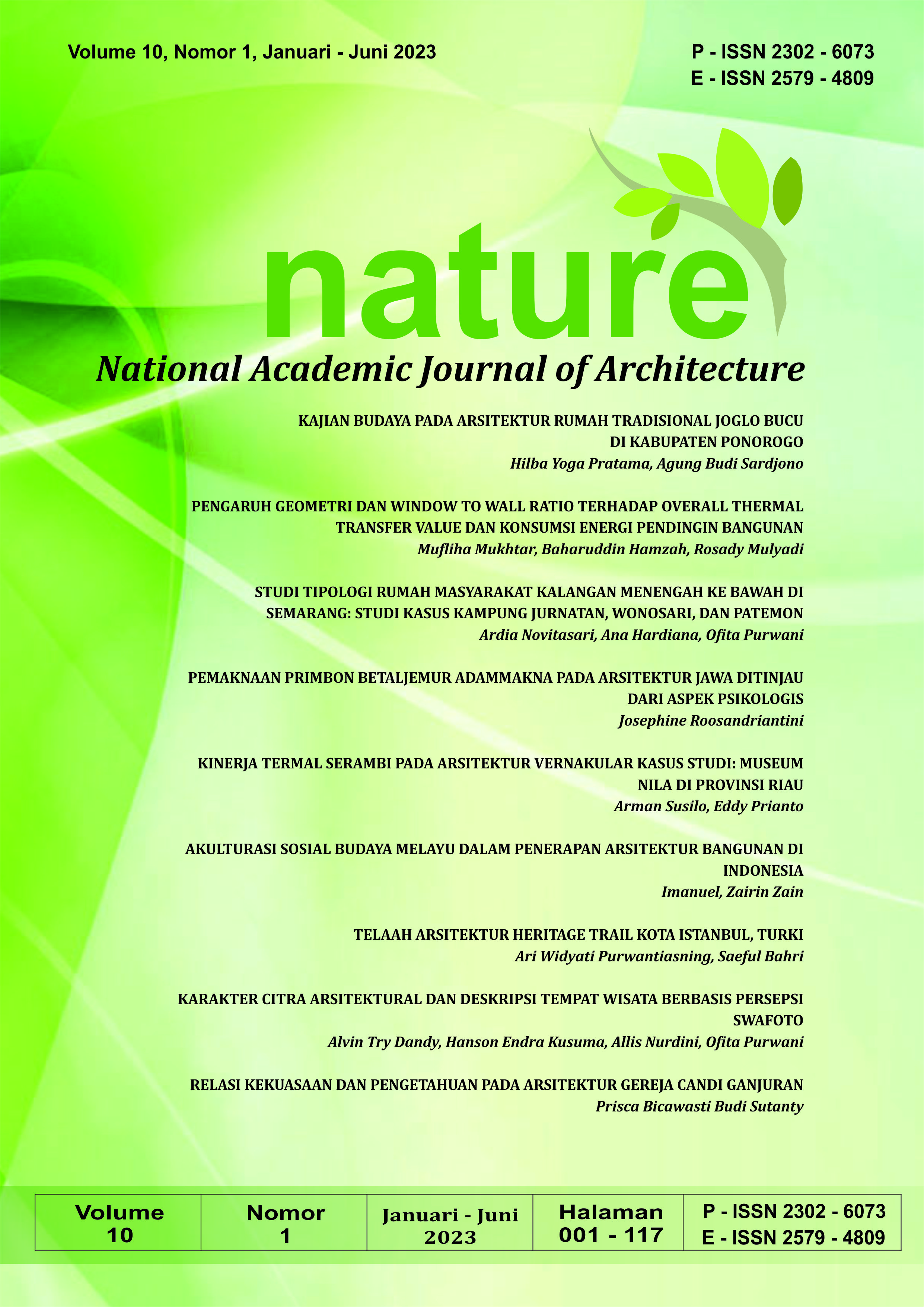KAJIAN BUDAYA PADA ARSITEKTUR RUMAH TRADISIONAL JOGLO BUCU DI KABUPATEN PONOROGO
Abstract
The traditional houses of each region in Indonesia are a distinctive symbol of the culture that exists in that area. One of these unique symbols is the traditional house in Ponorogo Regency, namely Joglo Bucu. Cultural values are depicted in buildings, ornaments, spatial planning, spatial functions, building structures, and ritual ceremonies in the construction procession. Not only does the physical form of each element of the traditional building display beauty but it is bound to the values of Javanese culture that prevail in society. Cultural values become social capital to bring out the identity, characteristics, and uniqueness of the area. The research method used is descriptive qualitative, collecting data through field observations, interviews with homeowners and workers in the Joglo Bucu development procession, and related literature studies. This study aims to explain the culture and customs of the Javanese people in the construction procession, aesthetic ornaments, cultural symbols, and the cosmological relationship between humans, nature, and God. The results of this study provide an exexplainof each character closely related to Javanese culture and customs. The construction procession ritual involves stages carried out by Javanese customary rules, such as looking for days according to Javanese primbon calculations and determining the direction of the building, ceremonies, or rituals. The architectural form of Joglo Bucu has a meaning related to Javanese cosmology. The room layout and placement of ornaments in Joglo Bucu are based on balance and harmony, reflecting beliefs about the relationship between humans and the universe. Decorations on Joglo Bucu have symbols that reflect beauty, strength, and prosperity. To provide a deep understanding of the cultural values in the Joglo Bucu traditional house in Ponorogo Regency.
Downloads
References
Budiharjo, E. (1997). Esensi Arsitektur Jawa dalam Arsitek dan Arsitektur Indonesia Menyongsong Masa Depan. Penerbit Andi.
Geertz, C. (1992). Tafsir Kebudayaan. Interj. In B. Susanto (Ed.), Francisco Budi Hardiman. Yogyakarta: Kanisius. Kanisius.
Hartono, J. (2004). Metodelogi Penelitian. Departemen Pendidikan Nasional.
Iswanto, D. (2008). Aplikasi Ragam Hias Jawa Tradisional Pada Rumah Tinggal Baru. Jurnal Ilmiah Perancangan Kota Dan Permukiman, 7(2), 90–97. http://eprints.undip.ac.id/20155/%5Cnhttp://eprints.undip.ac.id/20155/1/3_APLIKASI_RAGAM_HIAS_JAWA_TRADISIONAL_PADA_RUMAH_TINGGAL_BARU.pdf
Kusuma, T. A. B. N. S., & Damai, A. H. (2020). Rumah Tradisional Jawa Dalam Tinjauan Kosmologi, Estetika, Dan Simbolisme Budaya [the Javanese Traditional House in Review of Cosmology, Aesthetic, and Cultural Symbolism]. Kindai Etam : Jurnal Penelitian Arkeologi, 6(1), 45–56. https://doi.org/10.24832/ke.v6i1.58
Prakoso, B. P., & Wilianto, H. (2020). Penerapan konsep kejawen pada rumah tradisional Jawa. ARTEKS : Jurnal Teknik Arsitektur, 5(2), 165–172. https://doi.org/10.30822/arteks.v5i2.219
Priatmodjo, D. (2004). Makna Simbolik Rumah Jawa dalam Naskah Jawa Arsitektur Jawa. Wastu Lanas Grafika.
Prihantoro, A. (2005). Pasar Seni di Jogjakarta. Fakultas Teknik Sipil Dan Perencanaan Universitas Islam Indonesia, 1(Agustus).
Ronald, A. (1997). Ciri-ciri Karya Budaya diBalik Tabir Keagungan Rumah Jawa. Universitas Atma Jaya Yogyakarta.
Subiyantoro, S. (2011). Rumah Tradisional Joglo Dalam Estetika Tradisi Jawa. Bahasa Dan Seni, 39(1), 68–78.
Sudikno, A. (2010). Kearifan Lokal dalam Arsitektur Perkotaan dan Lingkungan Binaan Kearifan Lokal dalam Arsitektur Perkotaan dan Lingkungan Binaan. Seminar Nasional “Kearifan Lokal (Local Wisdom) Dalam Perencanaan Dan Perancangan Lingkungan Binaan” PPI Rektorat Universitas Merdeka Malang, 7 Agustus 2009, July, 1–9.
Sugiyono. (2016). Metode Penelitian Kuantitatif, Kualitatif, Dan R&D.
Tan, M. G. (1977). “Masalah Perencanaan Penelitian”, Metode Penelitian Masyarakat. In Jakarta: Gramedia. Gramedia.
Wibowo, H. J., Murniatmo, G., & Dh., S. (1998). Arsitektur Tradisional Daerah Istimewa Yogyakarta. 274.
Copyright (c) 2023 Hilba Yoga Pratama, Agung Budi Sardjono

This work is licensed under a Creative Commons Attribution-ShareAlike 4.0 International License.
By submitting your manuscript to our journal, you are following Copyright and License











